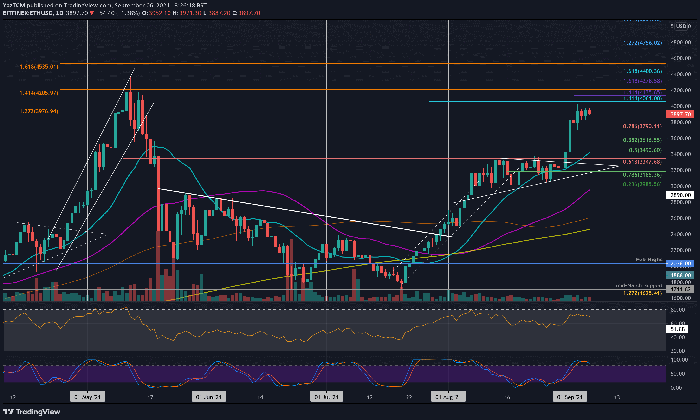In the ever-evolving landscape of crypto markets, excitement and opportunity reign supreme as traders look to capitalize on the latest trends. With Bitcoin price surging to $87,000, the focus shifts towards potential momentum in the coming days. Analysts are closely monitoring crypto volatility, particularly in light of recent economic reports that could influence consumer sentiment and the broader market landscape. As inflation impacts consumer behavior, understanding these dynamics will be crucial for investors navigating the current environment. This week promises to be pivotal, with key events that could shape the future of both crypto assets and the overall financial ecosystem.
Digital asset markets, often referred to as cryptocurrency exchanges or blockchain arenas, are poised for significant developments in the near future. As the price of Bitcoin reaches new heights, enthusiasts are turning their attention towards altcoins like Ethereum, seeking insights into their forecasts amid fluctuating investor confidence. The current climate is marked by increased crypto volatility and shifts in consumer attitudes that could dictate trading patterns. Moreover, the ongoing inflation crisis remains a critical factor, potentially altering the way investors perceive risk and opportunity. Understanding these correlations is vital for anyone looking to engage with the intricacies of this vibrant financial sector.
Understanding Crypto Volatility: What Lies Ahead
Crypto volatility has always been a defining characteristic of digital currencies, influencing investor sentiment and market dynamics significantly. As Bitcoin price fluctuates, it impacts the broader crypto markets, causing ripples across altcoins like Ethereum and Ripple. Traders and investors alike must brace for potential swings as external economic factors come into play this week, particularly with upcoming economic reports that could add fuel to current uncertainties. With the Federal Reserve’s monetary policy in focus, any unexpected moves could lead to increased volatility across the cryptocurrency landscape.
Moreover, crypto markets often respond sharply to changes in macroeconomic indicators, creating a feedback loop between traditional markets and digital assets. If consumer sentiment dips further, as indicated by recent reports, investors may become more risk-averse, resulting in a sell-off in crypto markets. Conversely, positive signs from the economic front might reinvigorate interest in digital currencies, leading to price rallies. Thus, navigating crypto volatility requires a keen understanding of not just market trends but also external economic cues that could sway investor confidence.
Inflation Impact on Crypto Markets: What to Expect
As inflation rises, its impact on crypto markets remains a crucial area of study for investors. The concern surrounding inflation expectations can result in increased interest in digital assets like Bitcoin, often seen as a hedge against traditional currency devaluation. Analysts believe that persistent inflation could drive more capital into cryptocurrencies, given their finite supply and deflationary nature, particularly with Bitcoin hitting historical price levels. This week, many are keen to observe how inflation-related news may shape consumer sentiment towards cryptocurrencies.
Moreover, the Fed’s response to inflation plays a vital role in determining the liquidity available in the markets, which directly influences crypto volatility. Should the Fed tighten monetary policy in an attempt to combat inflation, it could lead to fluctuations in the crypto market as traders react to shifting financial landscapes. Therefore, understanding the interplay between inflation and crypto markets is essential for anticipating trends and making informed investment decisions.
Economic Data Releases: Key Indicators for Crypto Traders
This week’s economic data releases, particularly the PMI and Durable Goods Orders reports, serve as critical indicators for crypto traders. Analysts rely on these metrics to assess economic health and potential shifts in monetary policy that can affect both traditional markets and crypto assets. Traders should stay vigilant, as shifts in consumer sentiment can significantly impact Bitcoin price and other cryptocurrencies. A strong report may bolster confidence in markets, while disappointing results could reinforce bearish trends.
Additionally, observing the reaction of crypto markets to economic releases can provide insights into investor sentiment dynamics. For instance, if the consumer sentiment index reflects optimism, we may see bullish momentum in crypto markets. Conversely, a pessimistic outlook could lead to some traders seeking safer assets, causing temporary dips in cryptocurrency valuations. Thus, the market watches these economic indicators closely, as they have the potential to trigger significant market movements.
Consumer Sentiment: Crucial for Market Performance
Consumer sentiment plays a pivotal role in determining the trajectory of crypto markets, as recent economic trends indicate. With the decline in consumer sentiment aligning with inflationary pressures, there’s concern among investors about future economic stability. Lower consumer confidence often correlates with decreased spending and investment, which can lead to volatility in both traditional and digital assets. This week’s sentiment reports could offer essential insights into how investors perceive the market, potentially impacting Bitcoin price and overall market performance.
Furthermore, the sentiment surrounding crypto is particularly sensitive to external economic factors, including inflation and government policies. As traders react to shifts in public confidence, we may see ensuing price changes in leading cryptocurrencies. A recovery in consumer optimism could reinvigorate crypto markets, driving prices higher, while continued pessimism may exacerbate fluctuations and bearish trends. Therefore, monitoring consumer sentiment is vital for those looking to navigate the ever-evolving landscape of crypto investments.
Bitcoin Price Predictions: A Look Ahead
Bitcoin price predictions remain a focal point for both seasoned traders and newcomers in the crypto markets. Following its recent climb past $87,000, analysts are cautious yet optimistic about what lies ahead for Bitcoin. Many are watching critical support and resistance levels, which could dictate the next significant price movement. Some experts posit that if Bitcoin can maintain its momentum, it might pave the way for new all-time highs, propelling the entire crypto market upward.
However, the context of larger economic events is crucial; unexpected announcements or data releases could substantially impact Bitcoin’s trajectory. If consumer inflation reports reflect increasing risks, it might instigate a more volatile period for Bitcoin and other cryptocurrencies. Thus, traders must remain vigilant and adaptive to changing market conditions, as this week could prove instrumental in shaping Bitcoin’s price outlook.
Ethereum Forecast: What Investors Need to Know
As Bitcoin leads the recovery, investors are also keenly watching Ethereum’s performance against both Bitcoin price and broader market trends. The forecasts for Ethereum this week are mixed, with some analysts suggesting that enhancements in its underlying technology could drive demand and elevate prices. If Ethereum shows resilience in the face of economic challenges, it may attract more investors looking for diversification in their digital asset portfolios.
Moreover, Ethereum’s movements closely mirror those of Bitcoin, often leading to correlated price behavior. However, any significant success in Ethereum’s smart contract utilization or network upgrades could yield considerable gains. As the week progresses, market participants should analyze Ethereum’s adoption rates and developments; any positive indicators could serve as a catalyst for price increments, influencing investor sentiment positively in the crypto markets.
Market Sentiment: Balancing Optimism and Fear
Market sentiment is a balancing act between optimism and fear, and this week suggests traders will experience heightened emotions amid significant economic announcements. Recent fluctuations in consumer sentiment can lead to divided opinions on market direction, resulting in varied responses from both retail and institutional investors. As traders digest economic data, the resulting sentiment will undoubtedly play a key role in shaping the behavior of crypto markets.
Furthermore, the ability to adapt to changing sentiment is essential for successful trading. Those who remain grounded in their strategies while monitoring market changes closely may find opportunities in the impending volatility. As the crypto markets engage with these emotional shifts, understanding how sentiments can sway prices will enable traders to make more informed decisions.
The Role of the Federal Reserve in Shaping Crypto Markets
The Federal Reserve’s actions and statements significantly impact both traditional and crypto markets. As the central bank navigates inflationary pressures, its decisions regarding interest rates can shift investor confidence and risk appetite. This week, many are analyzing remarks from Fed Chair Jerome Powell, anticipating how they will influence market dynamics, particularly in crypto. Should the Fed indicate a potential tightening in monetary policy, we might witness immediate reactions in Bitcoin and altcoins alike.
Moreover, the Fed’s approach toward monetary supply directly correlates with inflation and consumer spending, two crucial components that influence crypto markets. Traders must stay informed regarding the Fed’s decisions, as they can precipitate swift price movements in digital currencies. The tenuous relationship between traditional finance and the crypto world adds a layer of complexity that investors need to monitor actively during volatility.
Upcoming Earnings Reports: Big Tech and Its Ripple Effect
With significant earnings reports from major S&P 500 companies set for release this week, the potential for a ripple effect in crypto markets cannot be overlooked. Companies like Tesla and Alphabet hold considerable sway in market sentiment; their earnings can significantly impact investor psychology across sectors, including cryptocurrencies. If these tech giants face disappointing results, it might create a more cautious market atmosphere, causing fluctuations in Bitcoin and other crypto asset prices.
Conversely, robust earnings outcomes could bolster confidence, not only in traditional markets but in crypto markets as well, as investors may feel more secure in risking their capital on digital assets. The relationship between traditional and crypto markets necessitates that investors remain aware of these developments; the impact of big tech on crypto could present both opportunities and risks in navigating the ever-changing landscape of cryptocurrency investment.
Frequently Asked Questions
What factors are influencing Bitcoin price fluctuations in the crypto markets this week?
This week, Bitcoin price fluctuations in the crypto markets are primarily influenced by economic reports, consumer sentiment, and inflation expectations. The release of the Global Services and Manufacturing PMI data could signal changes in the economic landscape, affecting investor confidence in Bitcoin.
How does consumer sentiment impact Ethereum forecasts in the crypto markets?
Consumer sentiment plays a crucial role in Ethereum forecasts as it directly reflects how investors feel about the economy. A decline in consumer sentiment may lead to decreased investment in Ethereum and other cryptocurrencies, thereby affecting their prices in the crypto markets.
What is the significance of economic indicators for crypto volatility in the markets?
Economic indicators, such as the Consumer Sentiment Index and Durable Goods Orders, serve as predictors of market stability. High volatility in crypto markets can be expected if these indicators reveal negative trends, which could lead to fluctuations in the prices of major cryptocurrencies like Bitcoin and Ethereum.
How does inflation impact crypto markets and investor behavior?
Inflation can significantly impact crypto markets as it influences monetary policy decisions by central banks. High inflation expectations may lead investors to seek refuge in cryptocurrencies like Bitcoin, often seen as a hedge against traditional fiat currency depreciation, thus driving prices up.
What should investors watch for in crypto markets related to upcoming economic reports?
Investors should closely monitor upcoming economic reports, including the Consumer Sentiment Index and Consumer Inflation Expectations. These reports are crucial for understanding market sentiments and can trigger significant price movements in the crypto markets, particularly for Bitcoin and Ethereum.
| Key Points | Details |
|---|---|
| Market Overview | Crypto markets started the week positively, with Bitcoin at $87,000. |
| Economic Factors Impacting Crypto | Investor sentiment affected by US economic data and Trump’s tariffs. |
| Upcoming Economic Reports | Key reports include PMI data, Durable Goods Orders, and Consumer Sentiment Index. |
| Inflation Concerns | Experts warn of a looming inflation wave that may impact monetary policy. |
| Tech Earnings | 20% of S&P 500 companies, including major tech, to report earnings this week. |
| Analysts Predictions | Bitcoin shows signs of breaking out of a downward trend; Ether and Binance Coin also gained. |
Summary
Crypto markets are currently undergoing significant developments, influenced by various economic indicators and geopolitical tensions. As the week progresses, the data released, particularly regarding inflation and consumer sentiment, will play a critical role in shaping market sentiment. With Bitcoin showing resilience and breaking above key resistance levels, investors are watching closely how these factors will impact future movements in the crypto markets.
Crypto markets are once again capturing global attention as they kick off the week on a high note, with Bitcoin’s price soaring past $87,000 for the first time in weeks. This surge not only reflects an uptick in trading activity but also underscores the heightened crypto volatility that investors have come to expect. Analysts are closely monitoring the Ethereum forecast, as its performance could significantly influence broader market trends. With consumer sentiment fluctuating due to ongoing economic uncertainties and inflation impact looming, all eyes are on key economic indicators slated for release this week. As investors brace for the upcoming data, it’s clear that these volatile markets remain vulnerable to external factors that could shift their trajectory in the days ahead.
The landscape of digital currencies is rapidly evolving, with the cryptocurrency sector experiencing renewed intrigue among traders and analysts alike. As Bitcoin and other digital assets begin to demonstrate signs of recovery, discussions regarding price movements and market forecasts are intensifying. Notably, the anticipation surrounding Ethereum’s potential growth persists, as fluctuations in consumer perception play a pivotal role in shaping investor strategies. Additionally, economic pressures from rising inflation could significantly sway market dynamics this week. With ongoing crypto volatility in the backdrop, stakeholders are keenly observing how both local and global economic sentiments might affect the valuation of these emerging financial instruments.














